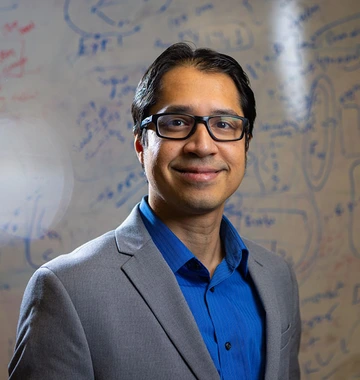When

Thursday, October 3, 2024 - 4:00 p.m.
Souma Chowdhury
Associate Professor
Mechanical and Aerospace Engineering
University at Buffalo
"Robust and Scalable Collective Autonomous Systems: Coordination Algorithms and Applications"
AME Lecture Hall, Room S212
Zoom link

Abstract: The concept of collective autonomous systems – e.g., robot swarms, fleets of aerial vehicles, and physical networks – promises task parallelism, resilience and flexibility in applications ranging from search and rescue, disaster response and critical infrastructure restoration to urban air mobility. "Adaptive coordination" of the constituent systems is critical for achieving generalizability, scalability, and fast decision-making, as an important step towards realizing this promise. Often these coordination problems, when mathematically represented, exhibit as an optimization under uncertainty or a complex combinatorial optimization problem. Adapting solutions to these problems to variations in the task space, operational environment and team size remains notoriously challenging. In this context, the seminar talk will touch upon our work on a spectrum of coordination algorithms, ranging from heuristics-based approaches and embodied Bayesian optimization to reinforcement learning over graph space, that address the above-stated challenges. We will then look at how these algorithms perform when applied to simulated use cases such as disaster relief delivery, signal source localization, fleet planning of flying taxis and restoration of a disrupted power grid. Lastly, we will take a glance at two emerging directions of research ensuing from this work – namely, how the morphology of individual systems can be tailored to advance their collective behavior; and how well the coordination algorithms perform when transitioned from simulation to physical platforms (particularly autonomous aerial vehicles).
Bio: Souma Chowdhury is an associate professor of mechanical and aerospace engineering at University at Buffalo (UB). At UB, he also serves as the co-director of both the UB Center for Embodied Autonomy and Robotics (CEAR) and the MS in robotics program. Dr. Chowdhury graduated with his PhD in mechanical engineering from Rensselaer Polytechnic Institute (RPI) in Troy, NY in 2012. His research interests lie at the intersections of multi-fidelity optimization and physics-informed machine learning, with applications to the design and operation of autonomous aerospace systems, multi-/swarm-robotics and resilient networks. He has co-authored 53 peer-reviewed journal articles, over 120 conference proceedings articles, and 3 book chapters in related topics. His work has been recognized by multiple best paper awards at IEEE and ACM conferences. His research has been supported by funding from the NSF, DARPA, ONR, NASA SBIR, AFOSR DURIP and Army SBIR, including the NSF CAREER Award. He is an associate fellow of AIAA, and a member of the AIAA Multidisciplinary Design Optimization (MDO) Technical Committee, where he chaired the Education Sub-Committee from 2021-2024. He is a member of the Design Automation Executive Committee in ASME, where he currently serves as the program chair of the Design Automation Conference. He also serves as a review editor for the Structural and Multidisciplinary Optimization journal.
